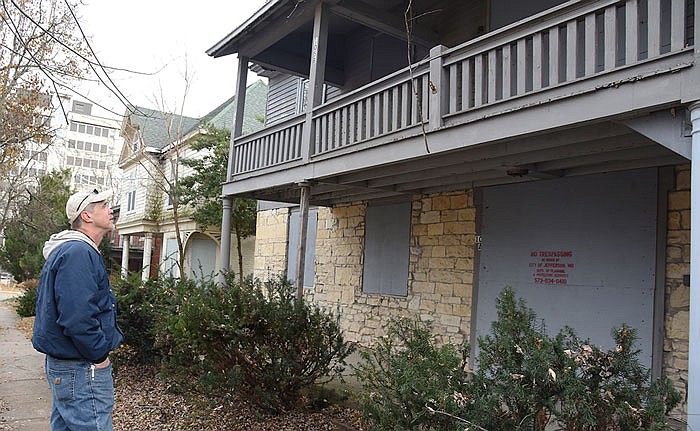A long-time relic hunter, William Gurley has become an expert on Jefferson City native Confederate Gen. Monroe Mosby Parsons by excavating inches of diaries, personal letters and court records.
He's walked the Arkansas battlefields where the Jefferson City general led his soldiers during the Civil War, but this week was the first time he had seen Parsons' hometown.
Hosted by the local Sons of Confederate Veterans (SCV) chapter, whose namesake is Parsons, Gurley was the guest speaker at the organization's Christmas gathering at the historic Colonel Bolton Home in Wardsville.
Several members also gave him a tour of the town's sites critical to Parsons, including his grave marker at the Old City-Woodland Cemetery, his home in the 100 block of Jackson Street, and the Cole County Confederate Soldiers Memorial at Riverview Cemetery.
"I've seen pictures; it's weird to be here," said Gurley, whose day job is a professor of pharmaceutical sciences at the University of Arkansas of Medical Sciences in Little Rock, Arkansas.
The local chapter in particular has been concerned about the fate of the Parsons Home, thought to be the oldest remaining home in the downtown area.
Gurley said he hopes his recent essays, published in the University of Tennessee's Confederate Generals in the Trans-Mississippi volumes one and two, and other articles he has written about Parsons might help protect and preserve the blue-painted, two-story log cabin.
"It would be a tragedy for that to be torn down, knowing the historical significance it has," Gurley said. "Civil War history is not always politically correct, but it was what it was.
"Parsons was a tragic hero because of what all he went through, survived and his demise in Mexico."
The 1830s-built Parsons House at 105 Jackson St. was named to the 2016 historic "Places in Peril" list, maintained by the Missouri Alliance for Historic Preservation.
The home was built by Gen. Parsons' parents, Gustavus and Patience Parsons. The general practiced law in Jefferson City while living with his parents and younger siblings there, with the exception of a time while serving in the Mexican War with the Cole County Dragoons, until the Civil War.
Before the war, Parsons also had served as U.S. district attorney, in the Missouri House of Representatives and in the Missouri Senate, even running for lieutenant governor.
Parsons and his soldiers served in all of the major battles of the Civil War west of the Mississippi River, Gurley said.
After the Confederate surrender at Shreveport, Louisiana, in June 1866, Parsons with his brother-in-law Lt. Col Austin Standish and other fellow Missouri confederate soldiers headed to Mexico, as they expected a poor reception if they returned to Missouri, Gurley said.
The truth of what happened to this band nine weeks later is an original piece of Gurley's published works. Local SCV member Randee Kaiser said the chapter was most surprised at learning the details of what happened to their namesake after the war.
In particular, Gurley's research benefited from the discovery of the court records when the Parsons and Standish widows sued the Mexican government.
The rumor that circulated for more than a century was that the former soldiers were killed by outlaws. Gurley discovered that they were, in fact, butchered by Mexican soldiers. The local families were awarded nearly $100,000 in gold from the foreign government.
"He knocked our socks off," Kaiser said. "(Gurley) is so conscientious in his research, and his writing style is appealing."

